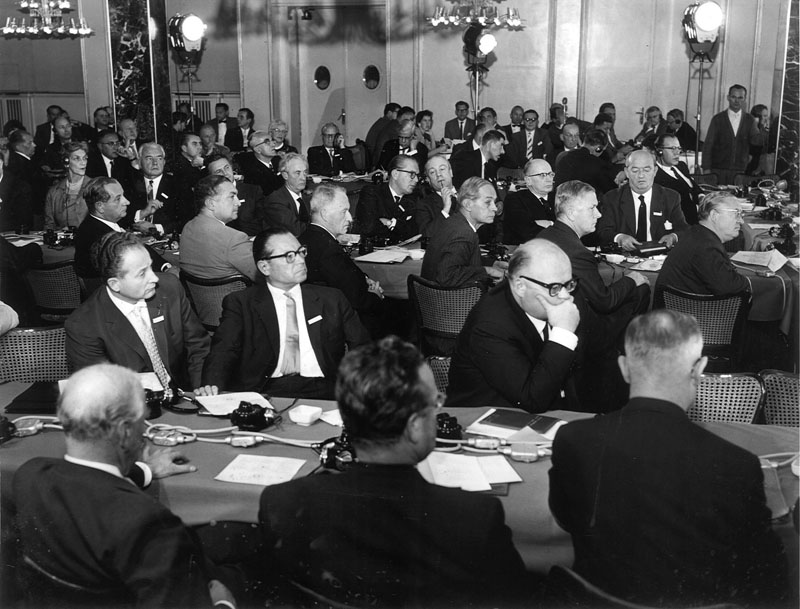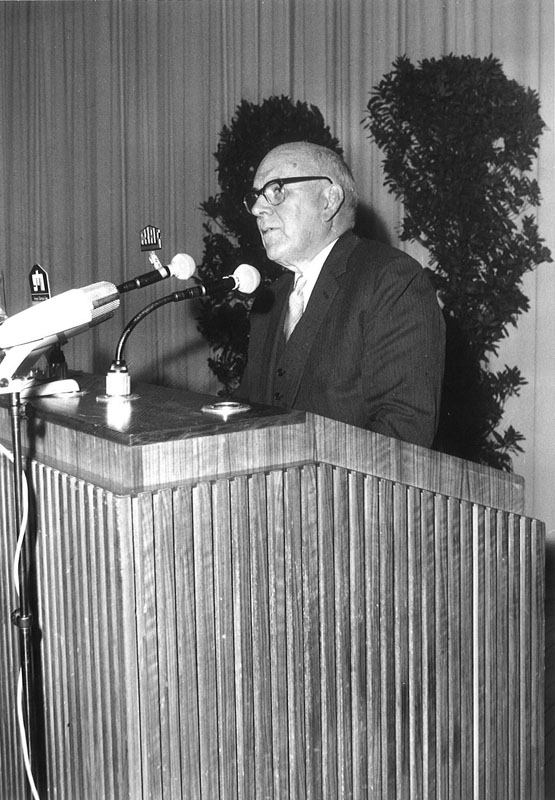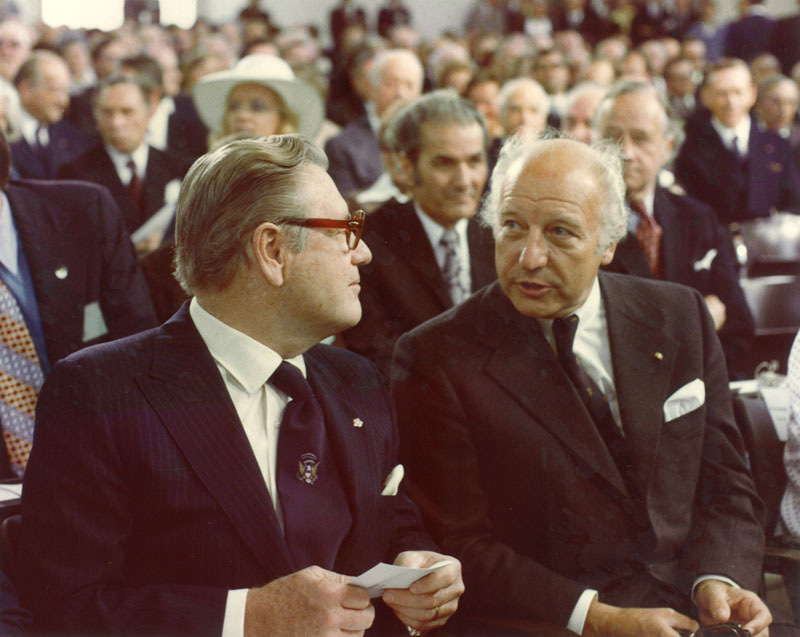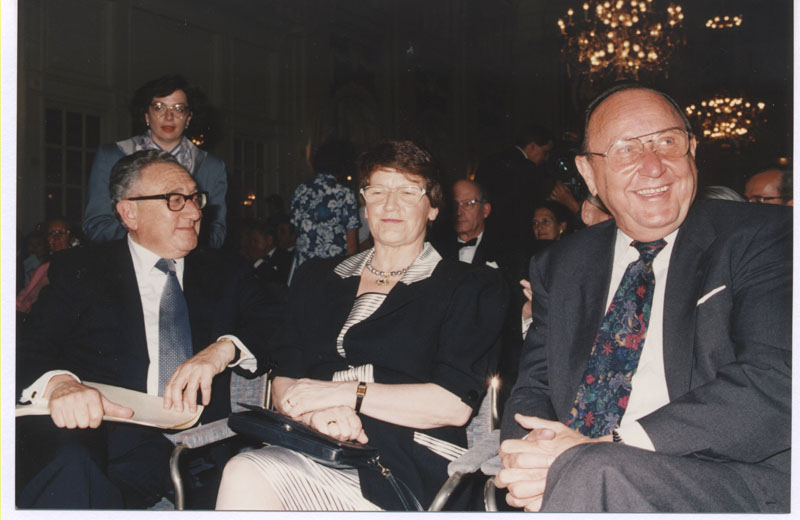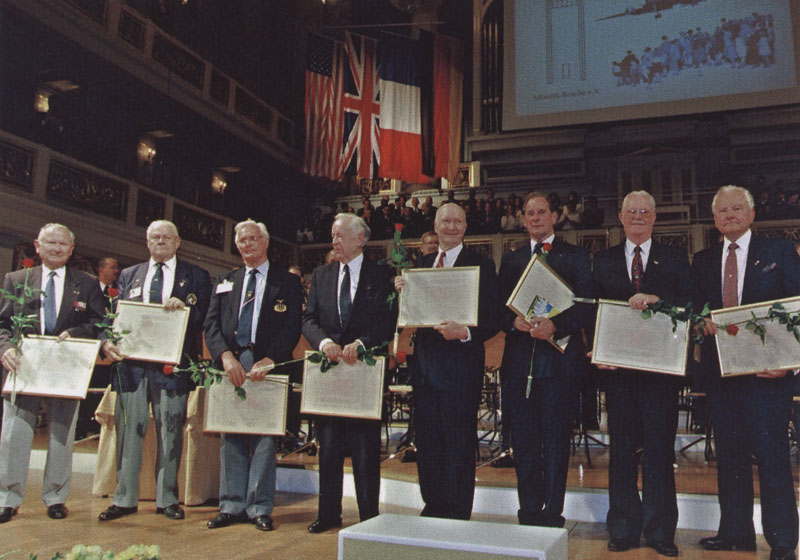Atlantik-Brücke’s Beginnings
How an association supported Germany’s departure for the international community
Atlantik-Brücke was founded in 1952. The Federal Republic of Germany was young, and there was a lack of civic culture to strengthen ties with the West in the long run. The founding fathers and mothers of the non-partisan association, which bore the name Transatlantic Bridge until 1956, wanted to rebuild American confidence in the Germans. They wanted to lay a solid foundation for a good transatlantic relationship.
The founders of the Atlantik-Brücke were Eric M. Warburg (banker), Erik Blumenfeld (entrepreneur and politician), Dr. Marion Gräfin Dönhoff (journalist and publisher of the German weekly “Die Zeit”), Ernst Friedlaender (journalist), Dr. Hans Karl von Borries (entrepreneur) and Dr. Gotthard Freiherr von Falkenhausen (banker). In the United States, the American Council on Germany (ACG) was founded at the same time as Atlantik-Brücke as its American counterpart.
Atlantik-Brücke’s office was initially located in Hamburg, moved to Bonn in 1983 to seek direct contact with politics, and has been based in Berlin since 1999.
A Meeting Place for German and American Leaders
Since its inception, Atlantik-Brücke has been committed to fostering personal encounters between German and American decision makers. Atlantik-Brücke offers high ranking decision makers from business, politics and academia a platform for meeting and networking with their counterparts on both sides of the Atlantic. The number of members is limited in order to preserve the exclusivity of the association. However, the number of members has nevertheless increased from 60 to 500 over the years, reflecting the growth of the German elite since the end of the war.
At small-scale events, Atlantik-Brücke’s members and guests have always found a protected space for confidential talks on transatlantic topics. One example for these events is the German-American Conference, which was first held in 1959. Organized in close cooperation with the American Council on Germany (ACG), these conferences are hosted alternating between Germany and the US. In 1973, the Young Leaders Program was added to Atlantik-Brücke’s repertoire; with it, Atlantik-Brücke promotes interaction between young German and American professionals. In 1986, Atlantik-Brücke expanded its scope to include Canada with annual German-Canadian Conferences.
Public Diplomacy in the United States
From its very beginning, another key aspect of Atlantik-Brücke’s work has been to inform the American public about Germany and in doing so, to spur an interest in the country and its people. For example, articles and letters to the editor were published in American media to explain German points of view. Also, German seminars for American teachers were first organized in 1965, and they still continue to reach and influence – directly and indirectly – a broad audience today.
Cooperation with the American Armed Forces
Cooperation with American forces stationed in Germany has always been a great concern for Atlantik-Brücke: from 1957-1970, the association published an English-language information leaflet for American soldiers stationed in Germany. In 1963, it expanded its efforts by establishing seminars for American officers. Besides this, annual expert talks with the U.S. European Command, during which German and American Generals are joined by representatives from politics, business and the media, have taken place in Berlin since 1990.
Atlantik-Brücke after the Cold War
The transatlantic relationship fundamentally changed with the end of the Cold War. Europe and America are faced with new economic, ecologic and political challenges and are part of a close-knit global network of actors. The transatlantic dialogue deals with new tasks and will be determined by many new topics. This also affects Atlantik-Brücke’s work. Established formats (such as conferences and working groups) are complemented by new programs.
The week-long seminars for US teachers, which have been running since the 1960s, were expanded in 2016 to include study trips to the US for teachers from East Germany to promote transatlantic dialogue in East German schools over the long term. Since 2019, the Young Leaders have had a Canadian counterpart. Each year, ten young professionals from Canada and Germany meet at the German-Canadian Conference as part of the Young Atlantiks Program.
The most recent innovation was the launch of the New Bridge program in 2021. It aims to better reflect the diversity of American and German societies in transatlantic relations by enabling young leaders from marginalised groups to familiarise themselves with the political, economic and social structure of Europe (or the US respectively) through a fully-funded study trip to Europe (or the US) and to engage in an interdisciplinary exchange on transatlantic relations.
Atlantik-Brücke is also evolving in regards to the issues it deals with. Today, Atlantik-Brücke continues to focus on issues of foreign and security policy, but also discusses the challenges and chances of digitization as well as the subject areas climate and energy.
=> Recommended reading: A book about Eric Warburg, founder of the Atlantik-Brücke.

